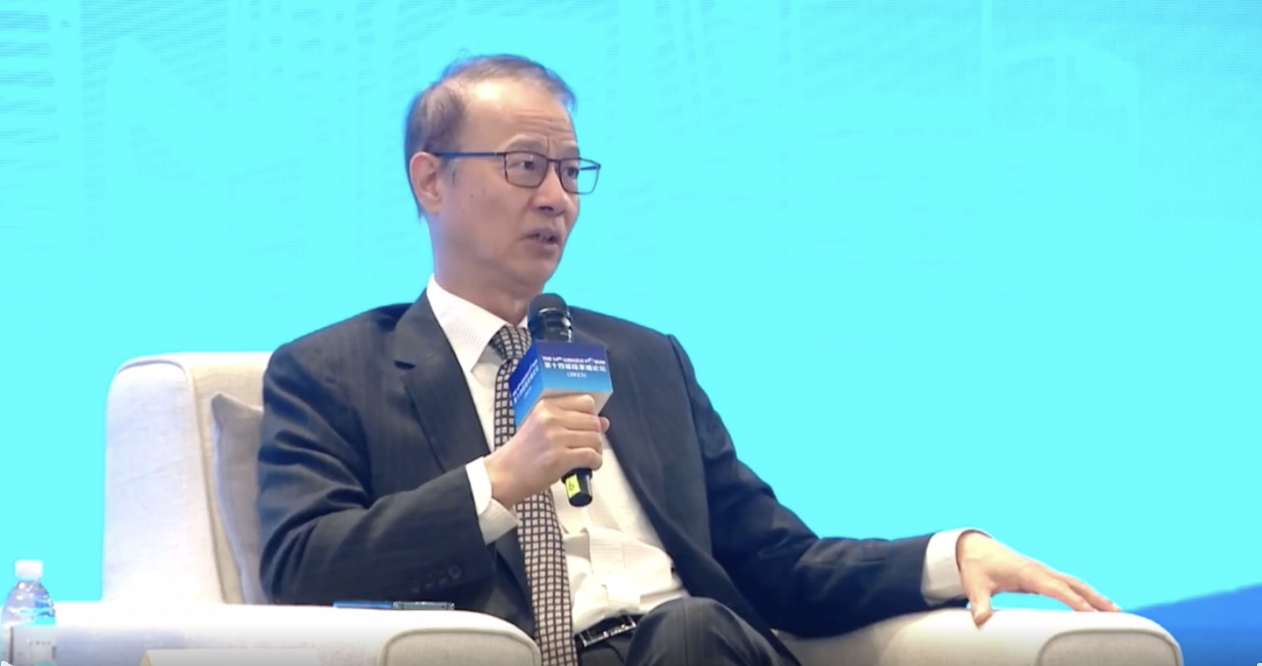
It's a great pleasure to join you at the Lujiazui Forum again. Today's topic is Common Prosperity and Inclusive Financial Development. I would say, the ultimate goal of inclusive finance is to achieve common prosperity. Let me start with an illustration: if a poor person walks into a traditional bank to get a loan as he is financially distressed, the chances are he would most likely be rejected. However, if a wealthy person who can offer a flat as collateral walks into the same bank, the bank would most likely gladly grant his loan.
If such is the only pattern of financial services we can get, then the rich will surely get richer and the poor poorer. Why? Because the rich have the access to leverage more funds. You know, a wise man once said, “Give me a lever long enough and a fulcrum on which to place it, and I shall move the world.” This is how traditional banks worked either in developed countries or developing countries. Such practices have led to a yawning wealth gap across the world. In the past decades, the emergence of inclusive finance has expanded the accessibility of financial services worldwide. China, in particular, has made remarkable strides in inclusive finance over the past decade. I’d like to summarize China’s inclusive financial development into two stages. The first stage starts on December 31, 2015, when the Plan for Promoting the Development of Financial Inclusion (2016–2020) by the State Council was issued, and ends in 2020: the mission of this stage is to address the underserved micro and small enterprises (MSEs) and reduce their financing cost.
Built on the achievements of the first stage, underlying issues need to be addressed in the second stage starting from 2020. The primary focus is placed on creating an inclusive financial ecosystem, enabling our entire financial system more inclusive and sound, i.e., more comprehensive in its scope. In other words, the top priority is to foster high-quality development of inclusive finance.
So, what are the key components of a high-quality inclusive financial ecosystem? In my opinion, in addition to credit, it should also encompass insurance, wealth management, investment, and financing, among other things. In particular, insurance plays a vital role for vulnerable groups, which is revealed in our research. In a sense, the poorer the household is, the more it needs insurance, much more than credit. For example, if a household relies on a single income, when something happens to the bread earner, it would be financially crippled. If a household does not have much savings, when a family member suffers from a critical illness, the medical bills may reduce the household into poverty overnight. That is why I say basic insurance products are critical to these vulnerable groups; however, these needs have not been met yet. For these people, a loan of RMB 50,000 may not immediately lift them out of poverty, as it takes time to produce and generate income, and it takes certain production capabilities. However, insurance that mitigates unforeseen risks can provide them with a fundamental safety net. Therefore, such financial services are truly inclusive.
Inclusive finance is more than insurance; it includes a broad spectrum. Take capital markets as an example, the ChiNext stock market, the SME board, and the STAR Market in China all embody the principle of inclusive finance. In a broader sense, they all fall under the umbrella of inclusive finance as they provide vital support to MSEs.
However, I would like to point out that in the context of mounting economic uncertainties, it is particularly important to finance startups. Not just providing credit, equity investment is equally important. Some businesses require minimal technical and vocational skills, such as a stall, but they are important too, as they can create jobs for young graduates. A small amount of startup capital can set young people on their feet. In my view, it is advisable to provide some funds to support such ventures, as it represents a crucial aspect of inclusive finance at the present stage.
Therefore, inclusive finance is much more than a couple of financial products; it should be an inclusive package, covering all levels and all types of financial products, including futures, insurance, and credit. All these products should be accessible to low-income people, especially those who have been hit hard by a multitude of factors in recent years.
Taking a deep dive, the establishment of an ecosystem has to deal with our existing banking system, so how to tackle the challenges faced by inclusive credit amidst structural adjustments? For instance, as large banks begin to serve communities and rural areas, are they crowding out rural commercial banks and village banks? In my opinion, a sound ecosystem of inclusive finance should stay away from homogeneous competition and foster a complementary structure. Say, is it possible that the large and small banks work like wholesalers and retailers? Large banks grant funds to small banks, which extend those funds with a modest margin to the targeted group. Such a pattern can give full play to the complementary advantages of banks of different scales. Internationally, we see that some countries include social responsibility as part of the performance assessment of large banks. In other words, if large banks extend loans to small banks, it is seen as fulfilling their social responsibilities. From an ESG perspective, such behavior is a plus.
Lastly, I wish to draw your attention to digital inclusive finance, which is the core of high-quality development, and it holds the future for inclusive finance, which has been well-recognized by the international community. The remarkable success China has made in inclusive finance in recent years is also largely attributed to the rapid growth of digital inclusive finance technologies.
These are some of my thoughts on the high-quality development of inclusive finance. Thank you for your attention.
THE END